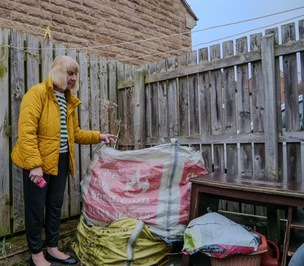WEDNESDAY marked the 40th anniversary of the miners’ return to work after 12 months on strike.
That day, in 1985, the defeated Barrow colliery pit men, defiantly march through the village of Worsbrough.
The procession is led by the colliery band and Arthur Scargill, as they make their way down Sheffield Road, past Corah’s clothing factory.
Hard at work inside the factory, that day, are many women who’re determined to leave their posts, for a short time, so they can show solidarity with their husbands, fathers, brothers, sons and neighbours.
The factory managers are equally determined to ensure that no such support is permitted.
Faye Litherland (not her real name) is an 18-year-old machinist and shop steward for the Hosiery and Knit Workers’ Union. Faye circulates a message to all her colleagues that she is planning a walk-out at 10.55 that morning and asks all workers to join her. But the task is not easy. Their working conditions are Dickensian – they’re not even allowed to converse during work time and can be dismissed for the regular flouting of this rule.
The boss announces repeatedly over the tannoy that those who leave their work without permission will be dismissed.
At precisely five minutes to 11, Kay and the other shop stewards switch off their machines, push back their chairs and stand. How many will join them? They don’t know. Faye can feel her heart thumping inside her ribs.
Suddenly, everyone else in her section also stops work and stands up, followed by workers in every part of the factory. Then they move like a flock of starlings, towards the exit door, with the line managers rooted to the spot – powerless to stop them.
It’s at this stage that all the women experience a thrilling sense of their collective power – especially now the din from the street can be heard. For the young Faye Litherland, it’s the first time in her life that she’s experienced such exhilaration at work and it feels magnificent.
Outside, as far as the eye can see, both pavements are lined with people, waving homemade banners, chanting and blowing whistles.
Faye starts to read the messages, crudely painted on large scraps of cardboard:
“EVERY DOG HAS ITS DAY”/ “PROUD OF YOU DAD”/ “WE SHALL OVERCOME”/ “BETTER TO FIGHT AND LOSE THAN NEVER FIGHT AT ALL”/ “LOVE YOU GRANDDAD”
200 yards up the road their heroes are approaching. The brass band, playing the William Tell Overture, gets louder with every step. Some of the machinists are on the pavement but many are standing on the low perimeter wall, cheering and clapping.
Almost everyone is weeping as the march reaches the factory gates; but they’re tears of immense pride.
Then the brass band has a rest and only the big drum can be heard beating to the steps of the marchers.
Boom! boom! boom! Boom!
Suddenly a large group of women from the factory begin to sing:
“We are women, we are strong/ We are fighting for our lives/ Side by side with our men/ Who work the nation’s mines...”
And the rest of the crowd join in with the song they’ve sung along to, so many times before.
As the marchers head towards the old level crossing, the cacophony subsides gradually and it’s time for the women to return to the factory.
Most of them are crying and one miner’s wife is sobbing so hard she has to be held up by colleagues.
As they re-enter the building, Miss Pinnock, a line manager, stands in the foyer with a face like thunder. She’s been told not to say anything but she can’t help herself.
“Losing pay for a bunch of communists. If I was prime minister I’d poison the lot of you,” she sneers.
“Aye, and if you were prime minister we’d all happily take the poison,” says Faye, bristling with anger.
Not one machinist is ever disciplined for their actions that day.
A few years later, Corah’s factory itself closes down permanently, and many, including Miss Pinnock, are thrown onto the scrapheap. And not long afterwards, those Nottinghamshire miners who were hoodwinked into supporting Mrs Thatcher, discover their pits are also to shut and they too have to experience life on the dole.
n As this Saturday is International Women’s Day, I dedicate this column to the indomitable spirit of Anne Scargill, Betty Cook, and the Women Against Pit Closures.



























